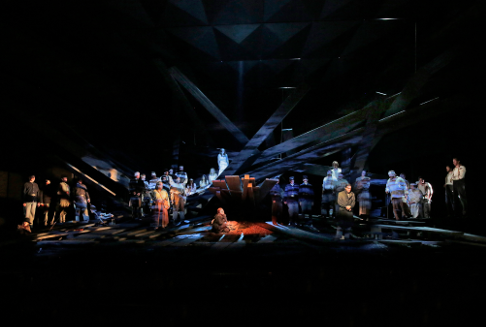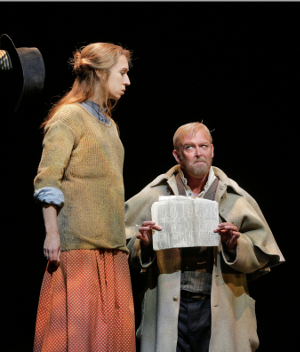![Isabel Leonard as Ada and Nathan Gunn as Inman [Photo by Ken Howard]](http://www.operatoday.com/2%20Isabel%20Leonard%20%28Ada%29%20and%20Nathan%20Gunn%20%28Inman%29%20in%20%E2%80%98Cold%20Mountain.%E2%80%99%20Photo%20%C2%A9%20Ken%20Howard%20for%20Santa%20Fe%20Opera.png)
03 Aug 2015
Cold Mountain Wows Audience at Santa Fe World Premiere
On August 1, 2015, Santa Fe Opera presented the world premiere of Cold Mountain, a brand new opera composed by Pulizer Prize and Grammy winner Jennifer Higdon.
English Touring Opera are delighted to announce a season of lyric monodramas to tour nationally from October to December. The season features music for solo singer and piano by Argento, Britten, Tippett and Shostakovich with a bold and inventive approach to making opera during social distancing.
This tenth of ten Live from London concerts was in fact a recorded live performance from California. It was no less enjoyable for that, and it was also uplifting to learn that this wasn’t in fact the ‘last’ LfL event that we will be able to enjoy, courtesy of VOCES8 and their fellow vocal ensembles (more below …).
Ever since Wigmore Hall announced their superb series of autumn concerts, all streamed live and available free of charge, I’d been looking forward to this song recital by Ian Bostridge and Imogen Cooper.
Although Stile Antico’s programme article for their Live from London recital introduced their selection from the many treasures of the English Renaissance in the context of the theological debates and upheavals of the Tudor and Elizabethan years, their performance was more evocative of private chamber music than of public liturgy.
Evidently, face masks don’t stifle appreciative “Bravo!”s. And, reducing audience numbers doesn’t lower the volume of such acclamations. For, the audience at Wigmore Hall gave soprano Elizabeth Llewellyn and pianist Simon Lepper a greatly deserved warm reception and hearty response following this lunchtime recital of late-Romantic song.
For this week’s Live from London vocal recital we moved from the home of VOCES8, St Anne and St Agnes in the City of London, to Kings Place, where The Sixteen - who have been associate artists at the venue for some time - presented a programme of music and words bound together by the theme of ‘reflection’.
'Such is your divine Disposation that both you excellently understand, and royally entertaine the Exercise of Musicke.’
‘And there was war in heaven: Michael and his angels fought against the dragon; and the dragon fought and his angels, And prevailed not; neither was their place found any more in heaven … that old serpent … Satan, which deceiveth the whole world: he was cast out into the earth, and his angels were cast out with him.’
There was never any doubt that the fifth of the twelve Met Stars Live in Concert broadcasts was going to be a palpably intense and vivid event, as well as a musically stunning and theatrically enervating experience.
‘Love’ was the theme for this Live from London performance by Apollo5. Given the complexity and diversity of that human emotion, and Apollo5’s reputation for versatility and diverse repertoire, ranging from Renaissance choral music to jazz, from contemporary classical works to popular song, it was no surprise that their programme spanned 500 years and several musical styles.
The Academy of St Martin in the Fields have titled their autumn series of eight concerts - which are taking place at 5pm and 7.30pm on two Saturdays each month at their home venue in Trafalgar Square, and being filmed for streaming the following Thursday - ‘re:connect’.
The London Symphony Orchestra opened their Autumn 2020 season with a homage to Oliver Knussen, who died at the age of 66 in July 2018. The programme traced a national musical lineage through the twentieth century, from Britten to Knussen, on to Mark-Anthony Turnage, and entwining the LSO and Rattle too.
With the Live from London digital vocal festival entering the second half of the series, the festival’s host, VOCES8, returned to their home at St Annes and St Agnes in the City of London to present a sequence of ‘Choral Dances’ - vocal music inspired by dance, embracing diverse genres from the Renaissance madrigal to swing jazz.
Just a few unison string wriggles from the opening of Mozart’s overture to Le nozze di Figaro are enough to make any opera-lover perch on the edge of their seat, in excited anticipation of the drama in music to come, so there could be no other curtain-raiser for this Gala Concert at the Royal Opera House, the latest instalment from ‘their House’ to ‘our houses’.
"Before the ending of the day, creator of all things, we pray that, with your accustomed mercy, you may watch over us."
The doors at The Metropolitan Opera will not open to live audiences until 2021 at the earliest, and the likelihood of normal operatic life resuming in cities around the world looks but a distant dream at present. But, while we may not be invited from our homes into the opera house for some time yet, with its free daily screenings of past productions and its pay-per-view Met Stars Live in Concert series, the Met continues to bring opera into our homes.
Music-making at this year’s Grange Festival Opera may have fallen silent in June and July, but the country house and extensive grounds of The Grange provided an ideal setting for a weekend of twelve specially conceived ‘promenade’ performances encompassing music and dance.
There’s a “slide of harmony” and “all the bones leave your body at that moment and you collapse to the floor, it’s so extraordinary.”
“Music for a while, shall all your cares beguile.”
The hum of bees rising from myriad scented blooms; gentle strains of birdsong; the cheerful chatter of picnickers beside a still lake; decorous thwacks of leather on willow; song and music floating through the warm evening air.
![Isabel Leonard as Ada and Nathan Gunn as Inman [Photo by Ken Howard]](http://www.operatoday.com/2%20Isabel%20Leonard%20%28Ada%29%20and%20Nathan%20Gunn%20%28Inman%29%20in%20%E2%80%98Cold%20Mountain.%E2%80%99%20Photo%20%C2%A9%20Ken%20Howard%20for%20Santa%20Fe%20Opera.png)
On August 1, 2015, Santa Fe Opera presented the world premiere of Cold Mountain, a brand new opera composed by Pulizer Prize and Grammy winner Jennifer Higdon.
The librettist was Gene Scheer who wrote texts for Jake Heggie’s Moby-Dick as well as Tobias Picker’s Thérèse Raquin and An American Tragedy. Scheer based his libretto for Cold Mountain on Charles Frazier’s historical novel of the same name. Higdon has successfully redirected her formidable efforts from the symphony to the theatre, and in doing so has produced a most memorable first opera. Not only do her vocal lines underline the personalities of each character, they are melodic, witty at times, and generally reflect the time and place of the setting.
Although director Leonard Foglia told his tale with occasional flashbacks, the action generally surged forward to capture the emotional punch of the novel. Robert Brill made his scenic design of dark boards juxtaposed at various angles. With the addition of Brian Nason’s lighting and Elaine J. McCarthy’s projections, they could be made to resemble land, sea, and the star-filled sky. David C. Woolard’s costumes were accurate as to time and place.
 Ensemble cast
Ensemble cast
Baritone Nathan Gunn sang the leading role of W. P. Inman, a wounded infantryman who deserts the Confederate army in an desperate effort to make his way back to Ada, his beloved. Gunn’s large, warm, resonant voice endeared him to listeners from the very beginning of the opera and the audience felt a loss when he died. As Ada, Isabel Leonard was a well brought up young lady who, in Act I, had no knowledge of how to survive in wartime. Her light, lyric mezzo-soprano voice denoted her youth and occasional exuberance, but it was not until the second act that she solidified her portrayal. It was the darker-voiced mezzo-soprano, Emily Fons, who created an immediately recognizable character in her depiction of the edgy, strong-willed Ruby. With golden sounds that included an opulent mid-range, she sang that her only teacher was hunger while she taught Ada how to live off the land and plan for a Spartan future.
Many artists portrayed smaller parts in this panoramic opera. Kevin Burdette was a notable blind man and a selfish deadbeat dad. Roger Honeywell gave a nuanced dramatic performance as Veasey, whose boat seemed to capsize in the air, dumping him and Inman into the dark of night. As Lucinda, whom Inman found hunting for valuables on the bodies left to rot on the battlefield, Deborah Nansteel sang with formidable vocal power while expressing the desperation of a runaway slave.
 Emily Fons as Ruby and Jay Hunter Morris as Teague
Emily Fons as Ruby and Jay Hunter Morris as Teague
Although tenors are usually heroes who get the girl, Teague, sung with great gusto by heldentenor Jay Hunter Morris, was a murderous villain who continually tried to cause trouble for anyone who did not support ideas of the Confederacy. Morris proved to be a singer whose bronzed tones could enchant an audience while they resonated with evil. Surprisingly, in the end it was not Teague who killed Inman, it was the young boy he had trained to carry on his violent work.
Some of the music of Cold Mountain hit the audience directly in the solar plexus. One of its most stirring moments took place when the dead soldiers who said they had long been forgotten, rose from their graves to tell the audience what they died for. Chorus Master Susanne Sheston’s male apprentices sang with nuanced dramatic power:
“Buried and forgotten
In our beautiful country
Where we lie buried We rest beneath every step you take,
In the dust, in the ground on which you tread.”
Conductor Miguel Harth-Bedoya led an orchestra of interesting proportions that offered pungent harmonies and displayed an enormous tapestry of musical color thanks to the inclusion of considerable brass and percussion. Currently, the opera is being recorded by the Dutch label, PentaTone. Since Cold Mountain’s five scheduled Santa Fe performances sold out early, a sixth one has been added.
Maria Nockin